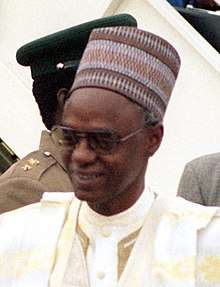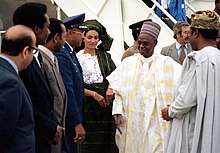Shehu Shagari
Shehu Usman Aliyu Shagari GCFR (February 25, 1925 – December 28, 2018) was a Nigerian statesman who became the first democratically elected President of Nigeria, after the handover of power by General Olusegun Obasanjo's military government. An experienced politician, Shagari also served seven times in a federal ministerial or cabinet post between 1958 and 1975. He worked as a teacher for a brief period before entering politics in 1951 and in 1954 was elected to the federal House of Representatives.
Shehu Shagari | |||||||||||||||||||||||||||||||||||||||||||||
|---|---|---|---|---|---|---|---|---|---|---|---|---|---|---|---|---|---|---|---|---|---|---|---|---|---|---|---|---|---|---|---|---|---|---|---|---|---|---|---|---|---|---|---|---|---|
 | |||||||||||||||||||||||||||||||||||||||||||||
| 6th President of Nigeria | |||||||||||||||||||||||||||||||||||||||||||||
| In office October 1, 1979 – December 31, 1983 | |||||||||||||||||||||||||||||||||||||||||||||
| Vice President | Alex Ekwueme | ||||||||||||||||||||||||||||||||||||||||||||
| Preceded by | Olusegun Obasanjo (Military) | ||||||||||||||||||||||||||||||||||||||||||||
| Succeeded by | Muhammadu Buhari (Military) | ||||||||||||||||||||||||||||||||||||||||||||
| |||||||||||||||||||||||||||||||||||||||||||||
| Personal details | |||||||||||||||||||||||||||||||||||||||||||||
| Born | February 25, 1925 Shagari, Northern Region, British Nigeria (now Shagari,Sokoto, Nigeria) | ||||||||||||||||||||||||||||||||||||||||||||
| Died | December 28, 2018 (aged 93) Abuja, Nigeria | ||||||||||||||||||||||||||||||||||||||||||||
| Nationality | Nigerian | ||||||||||||||||||||||||||||||||||||||||||||
| Political party | National Party of Nigeria | ||||||||||||||||||||||||||||||||||||||||||||
| Children | Muhammad Bala Shagari Aminu Shehu Shagari Abdulrahman shehu shagari | ||||||||||||||||||||||||||||||||||||||||||||
| Relatives | Bello Bala Shagari (Grandson) | ||||||||||||||||||||||||||||||||||||||||||||
In 1962, he was made the Turaki of the Sokoto Sultanate by the Sultan of Sokoto Siddiq Abubakar III. Turaki means an officer at court, in this case referring to the sultan's court at the palace of Sokoto. In addition, he held the chieftaincy titles of the Ochiebuzo of Ogbaland, the Ezediale of Aboucha and the Baba Korede of Ado Ekiti.
Early life
Shehu Usman Shagari was born on February 25 1925 in Shagari to a Fulani family. Shagari was founded by his great-grandfather, Ahmadu Rufa'i.[2][3] He was raised in a polygamous family, and was the sixth child born into the family. His father, Aliyu Shagari, was the Magajin Shagari (magaji means village head). Prior to becoming Magajin Shagari, Aliyu was a farmer, trader and herder. However, due to traditional rites that prevented rulers from participating in business, Aliyu relinquished some of his trading interest when he became the Magaji.[4] Aliyu died five years after Shehu's birth, and Shehu's elder brother, Bello, briefly took on his father's mantle as Magajin Shagari.
Shagari started his education in a Quranic school and then went to live with relatives at a nearby town, where from 1931-1935 he attended Yabo elementary school. In 1936–1940, he went to Sokoto for middle school, and then from 1941-1944 he attended Barewa College.[4]
Teaching career
Between 1944 and 1952, Shagari matriculated at the Teachers Training College, in Zaria, Kaduna, Nigeria. From 1953–1958, Shagari got a job as a visiting teacher at Sokoto Province. He was also a member of the Federal Scholarship Board from 1954–1958.[4]
Political career
Shehu Usman Shagari entered politics in 1951, when he became the secretary of the Northern People's Congress in Sokoto, Nigeria, a position he held until 1956[5].
In 1954, Shehu Shagari was elected into his first public office as a member of the federal House of Representative for Sokoto west[6]. In 1958, Shagari was appointed as parliamentary secretary (he left the post in 1959) to the Nigerian Prime Minister, Sir Abubakar Tafawa Balewa and that year he also served as the Federal Minister for commerce and Industries[7].
From 1959 to 1960, Shagari was the Federal Minister for Economic Development. From 1960 to 1962, he the Federal Minister for Pensions. From 1962–1965, Shagari was made the Federal Minister for Internal Affairs. From 1965 up until the first military coup in January 1966, Shagari was the Federal Minister for Works. In 1967 he was appointed as the secretary for Sokoto Province education Development Fund. From 1968–1969, Shagari was given a state position in the North Western State as Commissioner for Establishments.
Following the Nigerian Civil War, from 1970 to 1971, Shagari was appointed by the military head of state General Yakubu Gowon as the federal commissioner for economic development, rehabilitation and reconstruction. From 1971 to 1975 he served as the Federal commissioner (position now called minister) of finance. During his tenure as the commissioner of finance for Nigeria, Shagari was also a governor for the World Bank and a member of the International Monetary Fund (IMF) committee of twenty.
In 1978, Shehu Shagari was a founding member of the National Party of Nigeria[8]. In 1979 Shagari was chosen by the party as the presidential candidate for general election that year, which he won becoming the president and head of state of the Federal Republic of Nigeria[9].
Presidency

Shagari won the 1979 election with the help of his campaign manager, Umaru Dikko. The campaign had the support of many prominent politicians in the North and among southern minorities. The party's motto was "One Nation, One Destiny" and was seen as the party best representing Nigeria's diversity. Shagari ran for a second four-year term in 1983 and won the general election.[10]
Public works
During the oil boom, Shagari made Housing, Industries, Transportation and Agriculture the major goals of his administration[11]. In transportation, he launched some road networks across the country. He also initiated a program to foster the use of mechanical machinery in farming. This initiative favored large scale farmers in order to produce mass products. Shagari also created a low cost housing scheme.[12][13][14]
Industrialisation
In 1980, with the oil revenue, Shagari finished building the Kaduna refinery, which started operating that year. Also with the oil revenue, Shagari concluded the construction of an additional steel plant and three rolling mills at Ajaokuta. Shagari completed the Delta Steel complex in 1982. In 1983, Shagari created the Aluminum Smelter Company of Nigeria at Ikot Abasi. However, Shagari reduced the share of oil royalties and rents to state of origin from 30 to 2 percent.[15]
Agriculture
Shagari's government embarked on a "Green Revolution", distributing seed and fertilizer to farmers to increase nationwide productivity in farming[16] [17]
Economy
The fall in oil prices that began in 1981 affected the finances of the Nigerian government. Shagari "refused to embrace" structural adjustment from the IMF and World Bank as the crisis progressed,[18] and initiated an Economic Stabilization Program to help protect the country against a hard landing from prior highs of the 1970s and to steer the economy towards positive growth. Key objectives of the program were to limit import licenses, reduce government spending and raise custom duties. However, the result from the stabilization program was minimal.
Corruption
Even though Shehu Shagari was exonerated from personally being involved in corrupt practices, the Second Republic was plagued by allegations of corruption, including allegations of electoral fraud in the 1983 election. This, coupled with a decline in world oil prices, and a deterioration in the national finances, hardship, lead to the regime becoming deeply unpopular with citizens.
1983 Nigerian coup d'etat
Further information: 1983 Nigerian coup d'état
Shagari was overthrown by General Muhammadu Buhari in a military coup on 31 December 1983[19].
Personal life
Shehu Shagari married three wives: Amina, Aishatu, Hadiza Shagari.[4] He has several children, including Muhammad Bala Shagari and Aminu Shehu Shagari.
On 24 August 2001, his wife, Aisha Shagari, died in a London hospital following a brief illness.
Death
On December 28, 2018 at about 6:30pm, Shehu Shagari died from a brief illness at the National Hospital, Abuja where he was admitted to and undergoing treatment before his death.[20][21][22][23][24] It was confirmed by his grandson Bello Bala Shagari and Governor Tambuwal in similar tweets at the time of his death.[25][26]
Awards
_-_Nigeria_-_ribbon_bar.gif)

See also
- Cabinet of Shehu Shagari
- List of Presidents of Nigeria
- Sokoto
References
- "The old Bureaucracy is coming back – Eric Teniola". Nigerian Insight. Retrieved 19 June 2015.
- Pofile of Shehu Shagari
- Nuhu-Koko, Abubakar Atiku (26 February 2008). "Alhaji Shehu Usman Aliyu Shagari, GCFR, @ 83". Daily Triumph (Kano). Triumph Publishing Company Limited, via nigeriavillagesquare.com. Archived from the original on 27 February 2008. Retrieved 26 February 2008.
- Shehu Shagari, Beckoned To Serve: An Autobiography.
- Published. "Ex-President Shehu Shagari dies at 93". Punch Newspapers. Retrieved 27 May 2020.
- Chukwudiebere, Mercy (29 December 2018). "Life and Times of ex-President Shehu Shagari in Photographs". Voice of Nigeria. Retrieved 27 May 2020.
- Published. "Ex-President Shehu Shagari dies at 93". Punch Newspapers. Retrieved 27 May 2020.
- "Five tins you suppose know about Shehu Shagari Nigeria first Executive President". BBC News Pidgin. 29 December 2018. Retrieved 27 May 2020.
- "Shehu Shagari | president of Nigeria". Encyclopedia Britannica. Retrieved 27 May 2020.
- Obotetukudo, Solomon (2011). The Inaugural Addresses and Ascension Speeches of Nigerian Elected and Non elected presidents and prime minister from 1960 -2010. University Press of America. pp. 76–78.
- Jannah, Chijioke (29 December 2018). "Eight interesting facts about Nigeria's first executive president, Shehu Shagari". Daily Post Nigeria. Retrieved 27 May 2020.
- Arc. Irouke, Arc. Ajah and Ivoke, Vitalis M., Moses and Hyginus I. (2017). "An Evaluation of Shagari Housing Programme: A Case Study of three Towns: Abakaliki in Ebonyi State; Lokoja in Kogi State;Mbano in Imo State, Nigeria" (PDF). IIARD International Journal of Geography and Environmental Management. Vol. 3 (3): 58–67 – via IIARD pub.org.
- Obi and Ubani, Arc. Nich I. and Dr. Obinna (2014). "Dynamics of Housing Affordability in Nigeria". Civil and Environmental Research. Vol. 6 (3): 79–84.
- "FG to provide affordable housing with Shagari, Jakande models". Pulse Nigeria. 12 January 2016. Retrieved 28 May 2020.
- "Leadership, Policy Making, and Economic Growth in African Countries: The Case of Nigeria" (PDF).
- "Shagari's counsel on national issues will be missed — Gov. Okowa". Pulse Nigeria. 29 December 2018. Retrieved 28 May 2020.
- "History of agriculture in Nigeria | Agriculture Nigeria". 23 September 2013. Retrieved 28 May 2020.
- Badru, Pade (1998). Imperialism and Ethnic Politics in Nigeria, 1960-1996. Africa World Press. p. 91. ISBN 0-86543-603-7.
- "1983: Power seized in armed coup". BBC News. Retrieved 27 May 2020.
- "Shehu Shagari, Former President of Nigeria Dies at Age 93". OkayNG. 28 December 2018. Retrieved 28 December 2018.
- Warami, Urowayino (29 December 2018). "Buhari, Jonathan, Saraki, Ibori others mourn". Vanguard News Nigeria. Retrieved 29 December 2018.
- Published. "Ex-President Shehu Shagari dies at 93". Punch Newspapers. Retrieved 29 December 2018.
- Lawal, Nurudeen (29 December 2018). "Buhari mourns Shagari, describes him as man of unparalleled patriotism, humility". Legit.ng - Nigeria news. Retrieved 29 December 2018.
- Cowell, Alan (29 December 2018). "Shehu Shagari, Nigerian President During '80s Oil Crisis, Dies at 93". The New York Times.
- Oyeleke, Sodiq. "Latest News Shehu Shagari Died At National Hospital, Abuja – Tambuwal". Independent. Retrieved 30 December 2018.
- Shagari, Bello (28 December 2018). "I regret announcing the death of my grandfather, H.E Alhaji Shehu Shagari, who died right now after brief illness at the National hospital, Abuja". @Belshagy. Retrieved 29 December 2018.
Further reading
- Shehu Othman: "Classes, Crises and Coup: The Demise of Shagari's Regime". African Affairs. Vol. 83, No. 333.
- "Special advisers to the Nigerian President", 1979. BBC.
- "Nigerian Cabinet Changes", BBC, BBC Summary of World Broadcasts, February 17, 1982.
External links

| Political offices | ||
|---|---|---|
| Preceded by Olusegun Obasanjo |
President of Nigeria October 1, 1979 – December 31, 1983 |
Succeeded by Muhammadu Buhari |
